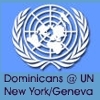

| BRIEFING - January 11, 2011 | To learn more about the Millenium Development Goals, click on the graphic Past Briefings: December 21, 2011 December 7, 2011 November 9, 2011 October 19, 2011 October 5, 2011 September 21, 2011 September 7, 2011 August 24, 2011 August 10, 2011 June 22, 2011 June 8, 2011 May 11, 2011 April 27, 2011 April 6, 2011 March 23, 2011 March 9, 2011 |
||
Advocating for global common good is moral imperative
Following on my previous briefing which highlighted the UN Climate Conference in Durban, South Africa, I would like to say a bit about “climate ethics.” In many values-based circles, climate change and its consequences are being addressed as both an ethical issue, and an issue of faith. Honduran Cardinal Oscar Rodriguez Maradiaga, who attended the Durban conference, said that for the Catholic Church, climate change is not only a matter of “thermometers or scientific analysis, we are talking about human beings, and the sufferings of human beings… Catholics need to know that climate change is real…” (America, Dec. 19, 2011). At the end of the day, it comes down to the very basic truth that we live in an increasingly interdependent world, in which the actions of some of us, affect the quality of life for all of us—and the integrity of Earth and her resources, as well. “Solidarity” is a word that is perhaps over-used, and, consequently, somewhat diluted. But Pope John Paul II’s words continue to pose a significant challenge to us all, both personally, and in the way we conduct our economic and political lives: “It is above all a question of interdependence. Solidarity is not a feeling of vague compassion or shallow distress at the misfortune of so many people both near and far. On the contrary, it is a firm and persevering determination to commit oneself to the common good; that is to say, to the good of all, and of each individual, because we are really responsible for all.” The “common good” is not a term used in public discourse regarding the issues of climate change or the economy. National self-interest, to the exclusion of all else, is what tends to drive decision-making. However, the “common good” is a key principle in Catholic Social Teaching, and should guide our response to these critical global issues. Last October, the Pontifical Council on Justice and Peace issued a stunning document calling for the reform of the global financial and economic system. Time and time again, the document reminds us all of the responsibility we have for one another: “Every individual and every community shares in promoting and preserving the common good. To be faithful to their ethical and religious vocation, communities of believers should take the lead in asking whether the human family has adequate means at its disposal to achieve the global common good.” When we consider the damage already done to Earth’s air, water and ecosystems, it is clear that the human family’s ability to achieve the global common good has been terribly compromised. In preparation for the UN Conference on Sustainable Development (RIO + 20) this June, Member States have submitted papers expressing their deep concerns regarding global climate change and their hopes regarding the outcome of the conference. The submission made on behalf of the Small Island Developing States (Fiji, Nauru, Marshall Islands, Micronesia, Palau, Papua New Guinea, Samoa, Solomon Islands, Tonga Tuvalu, Vanuatu) is instructive:
The Pacific Islands seem like a world away. Yet, we are citizens together of this one Planet, Earth. When any of Earth’s citizens suffer the devastating impact of climate change, our collective humanity is in some way diminished. As mentioned earlier in this briefing, many values-based organizations, as well as faith traditions, are trying to introduce the question of ethics into the public discourse regarding climate change. The Climate Ethics Campaign is one such organization. In its “Statement of Our Nation’s Moral Obligation To Address Climate Change,” the Climate Ethics Campaign addresses three significant points for the United States to consider:
The statement reminds us that “To disrupt the climate that is the cornerstone of all life on Earth, and to squander the extraordinary abundance of life, richness and beauty of the Planet is morally wrong.” The recent Vatican document on global financial and economic reform challenges “…communities of believers to take the lead in asking whether the human family has adequate means at its disposal to achieve the global common good.” As members of religious congregations, parishes and faith-based academic institutions, this is our responsibility: to persevere in asking the right questions, the questions that will ultimately dispel the lies of narrow national self-interest based on unlimited, fossil fuel reliant economic growth, and move us toward a more authentic solidarity for the sake of our common humanity, and our one precious home, Earth.
|
Dominican Leadership Conference
Building relationships and collaborating in the mission of preaching the Gospel
29000 West Eleven Mile Road
Farmington Hills MI 48336
248-536-3234 Contact: Executive Director
